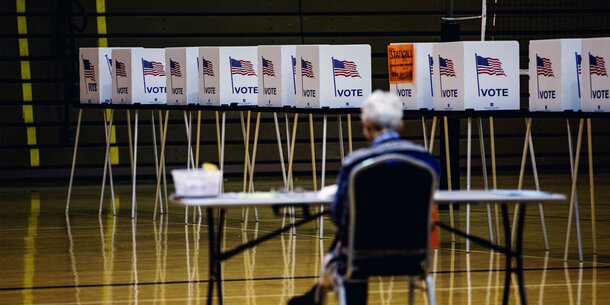Below, we analyze the partisan breakdown of the 24 state laws restricting access to voting this year (enacted as of June 3, 2021).1 Overall, we find that these new laws were enacted as part of an overwhelmingly partisan Republican push. Republicans introduced and drove virtually all of the bills that impose new voting restrictions, and the harshest new laws were passed with almost exclusively Republican votes and signed into law by Republican governors. The few bills that received Democratic support are generally less restrictive.
Twenty-two of the twenty-four restrictive laws were introduced and sponsored by Republicans or Republican-led committees. The two laws that included Democratic co-sponsors impose relatively modest voting restrictions. (Those are an Oklahoma law, H.B. 2663, that contains provisions that both expand and restrict voting access, and a Nevada law, S.B. 84, that expands permissible precinct sizes.)
Sixteen of the most restrictive policies enacted this year, in nine states, were passed on strict party-line or near party-line votes. The only substantially restrictive bill to receive Democratic votes was enacted in Arkansas, where three other severely restrictive laws passed on strict party-line votes. In other words, more than 90 percent of the most significant voting restrictions were enacted along party lines, and all of the states with the most restrictive new laws had strict party-line votes.
There are a handful of new laws containing provisions that make it harder to vote that received some Democratic support.2 Three of those laws are mixed, meaning they contain a number of policies that also expand voter access (in Kentucky, Oklahoma, Indiana). And for four of those laws, the restrictions are much more modest than the other voter suppression laws enacted this year (in Alabama, Idaho, Nevada, and Utah).
On the whole, our analysis shows that Republicans have led the most stringent and aggressive efforts to limit Americans’ access to the ballot box this year, and this push has been nearly unilateral, with little to no Democratic support.
Endnotes
-
1
Those laws include: AL H.B. 285, AL H.B. 538, AR H.B. 1112, AR H.B. 1244, AR H.B. 1715, AR S.B. 643, AZ S.B. 1003, AZ S.B. 1485, FL S.B. 90, GA S.B. 202, IA S.F. 413, ID H.B. 290, IN S.B. 398, KY H.B. 574, KS H.B. 2183, KS H.B. 2332, MT H.B. 176, MT H.B. 530, MT S.B. 169, MT S.B. 196, OK H.B. 2663, NV S.B. 84, WY H.B. 75, UT H.B. 12. -
2
See AL H.B. 538 (shortens the application absentee ballot deadline by two days); AR H.B. 1244 (establishes that non-photo IDs are no longer valid for voter identification); AR S.B. 643 (shortens the window for in-person return of mail ballots and application for mail ballots, and appears to ban use of drop boxes); ID H.B. 290 (creates new signature matching procedures for absentee ballots); NV S.B. 84 (increases the maximum number of active voters permissible in a voting precinct); UT H.B. 12 (requires cross-referencing of death certificates against voter registration rolls as the basis for purging, without notice to the voters being removed, auditing of the source data, and or matching criteria).
Mixed bills with restrictive and expansive provisions include: IN S.B. 398 (limits the use of drop boxes for absentee voting, but also expands the ability to return an absentee ballot on behalf of another, provides a notice and cure process for absentee ballots, and makes voting easier for individuals with disabilities); KY H.B. 574 (shortens the absentee ballot application period, restricts who can assist in returning absentee ballots, and creates a purge process that appears to violate federal law; also codifies the use of drop boxes and a notice and cure process for signature mismatches, creates an online absentee ballot request portal, and establishes no-excuse early voting on the Thursday, Friday, and Saturday before Election Day); OK H.B. 2663 (shortens the absentee ballot request period, but also adds one additional day in-person absentee voting, and one additional hour of in-person absentee voting on the Saturday before Election Day).


